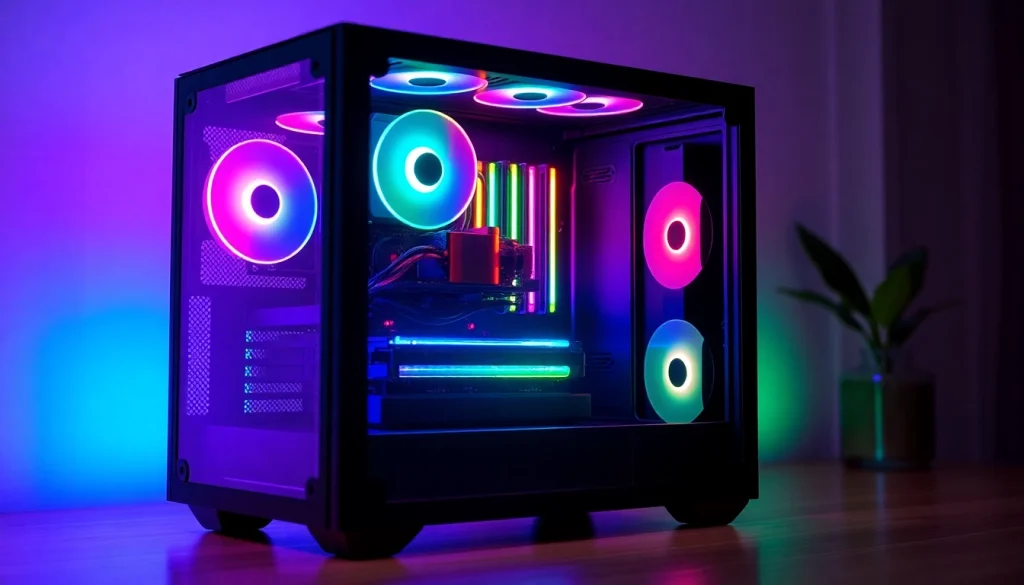Leading PC CASE Manufacturer: Stylish Designs and Performance

Understanding PC Cases
What is a PC Case?
The PC case, often referred to as the computer case or chassis, serves as the housing for the various components of a computer system. This enclosure not only provides physical protection for internal hardware such as the CPU, motherboard, and power supply but also aids in managing heat and airflow. A reliable PC CASE Manufacturer ensures that their products are designed with durability and functionality in mind, offering users the peace of mind that their components are safeguarded against dust, accidental impacts, and environmental stressors.
The Importance of Quality in a PC CASE Manufacturer
The choice of a PC case is a critical decision for any PC builder or enthusiast. A high-quality PC case manufacturer focuses on several key aspects to enhance user experience and equipment longevity:
- Material quality: PC cases are constructed from various materials including steel, aluminum, and plastic. Higher-quality materials not only withstand wear and tear but also improve aesthetic appeal and cooling efficiency.
- Thermal management: Effective airflow and cooling systems are essential in preventing overheating. High-quality cases are designed with strategically placed vents, fans, and sometimes even liquid cooling options.
- Ease of assembly: A user-friendly design is critical for those who may not be professionals. Cases that facilitate easy component installation and management of cables can save time and frustration.
- Customization potential: Many enthusiasts wish to personalize their builds. A good manufacturer enables users to modify their cases or add enhancements like RGB lighting with ease.
Types of PC Cases: A Comprehensive Overview
PC cases come in several types, each designed for specific use cases and preferences:
- Full Tower Cases: These spacious cases typically support larger motherboards (up to E-ATX), multiple graphics cards, and extensive cooling systems. They are perfect for high-performance gaming rigs and custom water-cooling setups.
- Mid Tower Cases: These offer a balanced option between space and size, accommodating standard ATX motherboards, and are suitable for most users looking for performance without excess bulk.
- Mini Tower Cases: Compact and designed for basic systems, these cases can house mATX motherboards and often fit into tighter spaces, making them ideal for users with limited desk space.
- Small Form Factor (SFF) Cases: Designed for minimalist setups and gaming on the go, these cases can be challenging due to limited space yet provide a unique aesthetic for portable gaming.
- Open-Air Cases: Such cases maximize airflow, making them ideal for high-performance builds, especially those employing overclocking. However, they can expose components to dust and physical damage.
Choosing the Right PC Case
Factors to Consider When Selecting a PC Case
When choosing a PC case, it’s crucial to take various factors into account:
- Size Compatibility: Ensure that the case can accommodate your chosen motherboard (whether ATX, microATX, or Mini-ITX) and has enough room for your GPU and other components.
- Airflow and Cooling Options: Look for cases with airflow designs optimized for your system. Some may offer more extensive fan mounting options, while others support liquid cooling setups.
- Budget: Cases can vary significantly in price. While it might be tempting to choose a low-cost option, investing in a quality case from a reputable manufacturer can be more cost-effective in the long run.
- Design and Aesthetics: Consider how the case will fit into your overall setup. Transparent panels, RGB lighting, and customizable features may be appealing for gamers and PC enthusiasts.
Best Practices for Cooling and Aesthetics
To ensure optimal performance and visual appeal, implementing best practices for cooling and aesthetics is vital:
- Fan Placement: Position case fans for optimal airflow—typically, you want a balance of intake and exhaust. Front-to-back airflow is often the most efficient.
- Use of Dust Filters: Many modern cases include dust filters to prevent debris from entering the system. Regular cleaning of these filters is essential to maintaining optimal airflow.
- Aesthetic Considerations: Employing cable management systems can drastically enhance the visual appeal of your build while improving airflow.
Popular Brands and Their Offerings
Several manufacturers dominate the PC case market, offering diverse designs and features:
- Corsair: Known for their stylish designs and excellent cooling solutions, Corsair cases often come with pre-installed fans and compatibility for advanced setups.
- Thermaltake: With a focus on gaming, Thermaltake offers numerous cases with RGB lighting and modular components, making them popular among gamers looking for customization.
- NZXT: This brand emphasizes minimalist designs without compromising on functionality, broadening accessibility for novice builders.
- Lian Li: Renowned for their high-quality aluminum cases, Lian Li products are ideal for users who prioritize aesthetics and durability.
- Fractal Design: Their cases often feature great airflow and clean, modern aesthetics, catering to both gamers and professionals.
Building Your Setup: Compatibility and Size
Full Tower vs. Mid Tower: What to Choose?
The decision between a full tower and a mid tower case can significantly impact build quality and performance:
Full Towers provide extensive space, making them suitable for high-end configurations, particularly when overclocking or running multiple GPUs. They typically support enhanced cooling options and more storage devices. However, they come with a larger footprint, which might be unnecessary for average users.
Mid Towers, conversely, strike a balance, catering to users who may not require the extra space but still desire robust capabilities. They are compatible with most standard builds while saving real estate, making them a popular choice for gamers.
Compatibility with Components
Compatibility must be at the forefront of your considerations when building a PC. This involves not only fitting the components themselves within the case but also ensuring that:
- There is adequate clearance for your CPU cooler and GPU. The specifications can usually be found in the case’s manual or on the manufacturer’s website.
- You account for the number of drive bays available for hard drives or SSDs.
- Additional expansion slots need to be evaluated for future upgrades.
Space Management Tips for Gamers
For gamers with limited space, maximizing usability while minimizing clutter is key in setup management:
- Vertical Stacking: Consider using wall-mounted shelves for additional monitors or peripherals to free up desk space.
- Compact Cases: Opt for slim or micro cases that fit precisely on your desk without taking too much surface area.
- Wireless Devices: Use wireless peripherals to eliminate cable clutter, which can make the space feel more organized.
Innovative Features in Modern PC Cases
Tempered Glass vs. Mesh Panels
The choice between tempered glass panels and mesh panels can affect both aesthetics and performance:
Tempered Glass: This material offers an elegant way to showcase internal components and RGB lighting, giving a premium feel to builds. However, its insulation may increase internal temperatures, making airflow design vital.
Mesh Panels: Functionally superior for airflow, mesh allows hot air to escape quickly while keeping dust at bay. This is an excellent option for performance-focused builds where cooling is a priority.
Integrated RGB and Smart Features
Modern PC cases increasingly feature integrated RGB lighting and smart functionalities that enhance user experience:
- RGB Lighting: Customizable RGB lighting strips enhance visual appeal, and products often come with software that allows users to match the lighting with gameplay for an immersive experience.
- Smart Cooling: Integrated fan controllers or compatibility with smart devices can optimize fan speeds based on temperature. This feature is ideal for maintaining performance without excessive noise.
Future Trends in PC Case Design
The landscape of PC case design is ever-evolving. Notable trends include:
- Eco-Friendly Materials: More manufacturers are focusing on sustainable options, using recycled materials in their cases to appeal to environmentally-conscious consumers.
- Modular Designs: Future cases may feature modularity, allowing users to create and customize setups based on their specific needs.
- Augmented Reality: The integration of AR interfaces for guidance on configurations and improvements is a futuristic interest reflecting the increasing blend of technology and user experience.
Additional Resources and Community Insights
Where to Buy: Top Retailers for PC Cases
When shopping for a PC case, consider various retailers that offer competitive pricing and a wide selection:
- Micro Center: A reputable storefront for all kinds of tech and hardware, Micro Center has a solid selection of cases.
- Amazon: For a diverse array of brands and customer reviews, Amazon typifies a resource for those looking to compare options.
- Newegg: A platform dedicated to electronic components, which is particularly appealing to PC builders.
- Local Computer Stores: Sometimes, local shops may offer personalized services and recommendations, being well-versed in the products they sell.
Community Reviews and Recommendations
Online forums and communities can be invaluable resources in learning about others’ experiences with specific cases:
- Reddit communities: Platforms like r/PcBuildHelp and r/buildapc are treasure troves for user insights regarding various cases. Users often post detailed reviews and photos of their builds.
- YouTube Case Reviews: Many tech enthusiasts create extensive reviews of cases, highlighting installation processes and cooling performances.
DIY Projects and Customization Ideas
For users passionate about DIY projects, customizing PC cases offers a creative outlet:
- Custom Painting: Personalize your case with painted designs or hydro dipping techniques.
- Modding for Better Airflow: Enhance airflow by modding your case, especially by adding or altering fan placements and sizes.
- Building Custom Panels: Fabricating bespoke acrylic or wooden panels can add unique aesthetics while improving functionality.







